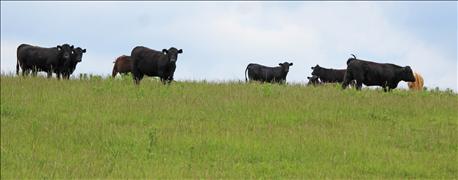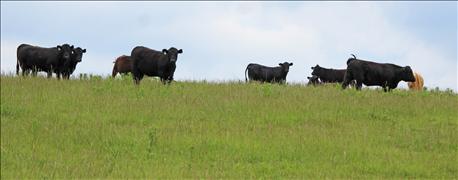November 5, 2016

When selecting heifers, there is more than meets the eye.
To make advances on traits that pay premiums, take a look inside for the replacement heifers’ genetic potential. Adding quality beef genetics pays for years to come.
Look at the data
Wise decisions on selecting heifers from within a herd may take more records than most producers keep.
Recording calving dates early in the season helps. As replacements, older heifers likely reach puberty earlier in a defined breeding season.
“Many times, producers may be spinning their wheels when it comes to selecting heifers based on their looks, or limited data,” says Jared Decker, University of Missouri Extension geneticist.

NEXT UP, DNA: Farmers will find new production information when they look beyond the hide and into the genetics of a replacement heifer. It is there they will find more details about the animal.
A quicker approach to adding better replacements is to buy them. These can come with genetics and management from breeders specializing in developed heifers.
In Missouri, they are Show-Me-Select (SMS) producers. The fall sales of spring-calving heifers are upon us.
In 19 years of Show-Me-Select, many herd owners find that outside-the-herd replacements simplify life.
To meet a growing need, many producers became seedstock providers on the female side.
Benefits to breeders
Long ago, herd owners left bull production to seedstock suppliers. Saving a replacement bull isn’t considered. Bulls can be purchased based on their records. Why not females?
Producers who learn the luxury of calving ease, among other traits, pay extra at Show-Me-Select sales.
“Repeat buyers are our best customers,” says David Patterson, MU Extension specialist. His research at the MU Thompson Farm led to more fixed-time AI breeding. That led to better genetics in herds.
Breeders benefit from management and genetic progress made in current SMS herds. A good way to learn those skills is to enroll in the yearlong program with regional MU Extension livestock specialists.
Great strides have been made. More is just ahead with female DNA testing.
DNA in blood from a calf’s ear or tail hairs with roots can project its future progress, Decker says. In genetic research at Thompson Farm, he’s collected genomics on all females in the herd.
Previous studies there led to fixed-time AI protocols now used across the nation. Those studies continue; however, heifer DNA research opens new doors.
With more profitable cow herds, Missouri’s forage-covered hills become more valuable.
Show-Me-Select heifer sale dates
Sales not only provide sources of quality-checked heifers but also provide places to learn about heifer genetics. A north Missouri sale is restarting at Kirksville.
Here are some upcoming fall sales of SMS replacement heifer at auction barns in towns. The sale times are shown, along with the local Extension specialist in charge.
• Carthage: Nov. 18, 7 p.m., Eldon Cole, Mount Vernon, 417-466-3102
• Kirksville: Nov. 18, 6 p.m., Zac Erwin, 660-665-9866
• Kingsville: Nov, 26, 11 a.m., David Hoffman, Harrisonville, 816-380-8460
• Fruitland: Dec. 3, 1 p.m., Erin Larimore, Jackson, 573-243-3581
• Palmyra: Dec, 10, 12:30 p.m., Daniel Mallory, New London, 573-985-3911
Dailey is a retired MU Extension professor. He writes from his home in Columbia.
You May Also Like




